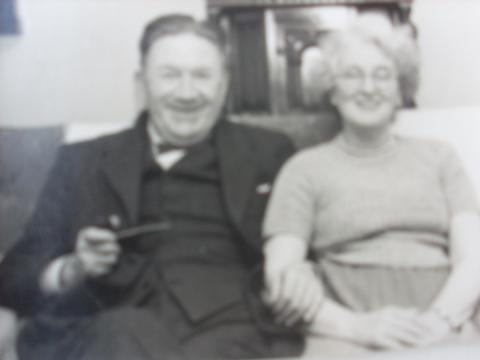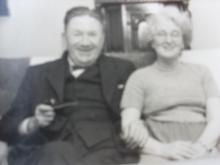Notes from Tony Banham (see his diary for 10 Dec 2009):
Lee sent an amazing document, the post-war report of Charles Mycock (headmaster of the Ellie Kadoorie School – see November). Mycock was headquartered at Woodside while Commandant of the Taikoo Braemar Dispersal Area for Refugees (which included the famous concrete rice kitchens which are still there). Now finally I know what happened there, and on the road from Quarry Gap to Quarry Bay. A real find. Interestingly, Mycock wrote it in 1945 while recuperating at Lower Hutt. The Hutt Valley was the first part of New Zealand I ever visited.
The 1938 Annual Report for the Education Department lists him as Headmaster of the Ellis Kadoorie School. (See page O19, point 11.)
There are also a couple of threads about Charles Mycock on the Stanley Camp discussion list:


Comments
Early life
My grandfather was born in 1890 in Buxton, Derbyshire, the eldest of five boys. His father was a carter by trade, illiterate and unable to write even his own name. Despite this, [or maybe because of it],my grandfather was a keen scholar with a photographic memory.
By the age of 16 he was teaching at his former school and was encouraged to take the University entry examinations. He scored such excellent marks that he was accused of cheating, possibly because of his humble background. Incensed by this, he insisted upon being examined a second time and again demonstrated his abilities but missed entry to the University Year so he left England in disgust to sail for Canada. He arrived there in 1911 and briefly joined the Canadian Mounted Police before signing up to a Canadian Pacific Steamship Company vessel. He worked his way across the Pacific as a deckhand and on arrival in Hong Kong he immediately secured a teaching job with a private company under cotract to the Hong Kong Government. However, he was still under contract to the steamship company and had to deckhand his way back to Canada before returning to Hong Kong as a paying passenger on the same vessel!
Being under contract to teach for 3 years he missed the early years of WW1 but as soon as he was free he returned to England and promptly paid £3 to join the Army [H.A.C] After his training he was sent to France and was badly wounded at Paschendale. After his stay in hospital he was discharged from the army and in May, 1917 he returned to Buxton to marry his childhood sweetheart. After the war both he and my grandmother set off for Hong Kong and both taught at the local schools. My grandfather was also appointed a magistrate and served in that capacity for many years. Eventually the company for whom they worked was taken over by the Education Department of the Hong Kong Government. My grandmother left teaching in 1924 as she was expecting her second child but Grandad carried on.
My uncles' earliest memories included the house on Leighton Hill, a rather grand colonial style house with high ceilings, wide verandas and views of the harbour. When Edwin became of school age they moved to Nathan Road, Kowloon to be close to the Kowloon British School which he attended. The family car was an Austin 10 and driving was very hazardous because of the Chinese who would dash in front of the moving car in an attempt to kill the ghosts they believed were following them! After serving as headmaster of Yaumati School, where he built an excellent reputation for the management and teaching of the school, he became headmaster of Queens College and, eventually, the Ellis Kadoorie Chinese School.
Their closest family friends were the Langstons, Arthur, head of the H.K. Electric Co., his wife Dorothy, [daughter of Mr. Morrison, Dean of H.K. University], and their children Arthur Jnr., Rita and Maurice, the three of whom were in touch with Edwin for many years.
In 1936 the family returned to England, grandad on leave, grandma and the boys to live in Southeast London so that the boys could join their eldest brother Reg, [my father,] at Colfes School. Once his leave was up, grandad returned to Hong Kong, little knowing that he would not see his family again for 10 years.
Wartime & afterwards
His report of his wartime experiences is given at http://gwulo.com/node/13674
The following abbreviated account is solely from my late uncle Edwin's unpublished papers which he was kind enough to send to me when I asked him about grandad:
My father had been taken prisoner by the Japanese in Hong Kong in December 1941. At that time, apart from his usual occupation as Headmaster of one of the schools there, he was the Commandant of the Taikoo Braemar Dispersal Camp for Refugees. The Japanese eventually landed on Hong Kong Island and after many harrowing experiences in which he saw many of his friends brutally murdered and his female staff raped by the Japanese, my father was interned in Stanley Camp.
When he was finally released in September 1945 he was shipped to a hospital in Wellington, then Aukland, in New Zealand, to recover. Up until that time we knew none of this, and did not even know if he had survived his time in Hong Kong, and had not, of course, seen him since his last leave in in England in 1936.
I finally tracked him down to a hospital just outside Southampton and was more then a little concerned at what I would find when I finally got to see him. I need not have worried - he was far from well but full of spirit and demanding he be released and allowed to return to my mother and our home in Tunbridge Wells, so much so that when I discussed the problem with the elderly Matron of the hospital, she readily agreed that both he - and she - would be better off if I could take him home! However, this was easier said then done for the Matron explained to me that nobody could authorise my father's release until he was completely well which could be some months away. She also made the point that should he discharge himself he would lose all future Government monetary benefits. I pointed out that I only had a limited time on leave, and argued that he would recover more quickly at our home and that outweighed any consideration he would get from the Government by staying in the system. Finally, at considerable risk to herself, she said that if I would accept full responsibility, she would help me spirit him out of the hospital.
The necessary arrangements were made but I did not tell my father for fear that he would suddenly change his atttitude, which was not entirely cooperative at the time, and raise suspicion. On the following night I parked my car outside the back entrance to the hospital and took the lift to his ward where, right on the dot of midnight, true to her promise, the Matron was waiting for me during a changeover of nurses, none of whom were in evidence, with a wheelchair. I found my father fast asleep and clapped my hand over his mouth so he would not wake any of the other patients when he woke up, and whispered details of the plan. He was delighted and in no time I had him dressed and in the wheelchair, said a grateful farewell to the Matron, and got him into the lift, out of the hospital and into the car. I then then headed for the nearest public telephone, and phoned my mother to tell her to make sure our doctor would be waiting for my father when we arrived home, and I drove back to Tunbridge Wells with my father becoming more and more excited by the minute. When we finally arrived at around 5am, he was reunited with my mother and put into the care of our faithful GP who had been patiently waiting for him most of the night.
By this time my leave was up and I had to return to Norway but under the constant care of our GP my father made a rapid recovery, and although he was never again well enough to work full time again, he became as well as could be expected after his ordeal. He eventually had a stroke and died at the age of 65 but not before I was able to spend some memorable and treasured times with him.
That is the end of my uncle's account. As my grandfather died when I was 5 all I knew was a wonderful cuddly man who never tired of telling me stories, singing me songs and who had taught me to read A.A. Milne's Winnie the Pooh books by the age of three.
Regards, Lee
Charles Mycock
Re: Charles Mycock
According to the Government Gazette issued on 25 January, 1940 he was enrolled in the Essential Services Group. The info is available online at the HKGRO.
.
theodore leslie bell
do you know the whereabouts of any photos of the above mentioned chap Charles wrote about? In 1941? He was shot.
re: theodore leslie bell
No photo, but some more information about him at: http://gwulo.com/node/13665